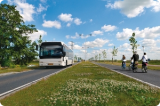
Report - New mobilities in suburban and rural areas
The Centre d'analyse stratégique has released a report:
"The new mobilities in suburban and rural areas".
Today we face multiple issues when travelling: congestion in major cities, climate change, rising energy prices weighing on private budgets of those who are forced to travel by car, and social equality concerns. These are some of the reasons for why we should rethink the role of the car in our society..
Our cars cannot be considered sustainable today primarily because the use of cars is incompatible with the energy and environmental requirements. Greenhouse gas emissions from transportation has increased by nearly 20% since 1990, the number of vehicles and the number of trips we make has doubled in thirty years; this level of car use could not be sustained in emerging countries.
In addition, the use of cars can in some cases increase the fragile state of poor people, especially if one takes into consideration the energy costs that are expected to rise. We’re faced with a vehicle dependence-spiral. This spiral tends to exclude certain categories of people: the disabled, elderly, children, teens, and of course the poorest households. Therefore, we should offer alternatives for low density areas, such as suburban and rural areas. The development of mobility at a reasonable price and accessible to as many people as possible is challenging, especially because of how sensitive it is to crises.
The organization of areas and lifestyles should therefore not be determined by the exclusive use of cars anymore. In order to organize land and sustainable ways of life, to find new room for adaptation, to provide mobility solutions to all we need approach the question of mobility differently.
The transportation industry will face many issues in the future. Some have already seen daylight:
- the car is no longer a dream, especially among younger generations. Today, many French people seem willing to share or rent rather than buy. Therefore, the concept of service and use will become increasingly important and will no doubt create a new version of the car value chain;
- applications of the digital revolution, that is, being connected to the web at anytime, anywhere and with any device, is only in its early stages in the transport sector;
- a generation of hybrid or fully electric vehicles is growing and offers new possibilities to use them according to their actual performance and autonomy. It is expected to continue to grow in coming years;
- Finally, the role of local initiatives, especially local authorities, will be increasingly important in the future.
Our future mobility will not come from one single innovation, but from the dissemination and from the social acceptability between the many participants. Even if the report by Centre d’analyse stratégique on new mobilities could consider a number of solutions for mobility in the city or in nearby urban areas, solutions for rural areas and suburban areas are much more complex: because of the geographical area public transportation is inefficient and this area therefore requires an almost exclusive focus on the use of cars.
The future of mobility in areas with low population density therefore deserves special attention and consideration. This is why this report has a particular forward-looking point of view.
Following the work by the Department of Sustainable Development at Centre d’analyse stratégique for over a year, this report suggests ways and means of action that combine the concern for the environment and mobility while taking into account the price of energy. The six recommendations presented could be implemented with modest public expenditures and a substantial level of information and consultation with residents.
- President: Paul-Olivier Dubois-Taine, Chairman of the Working Group, Honorary Engineer of the Highways
- Speakers: Christine Raynard, project manager and Francis Vielliard, project manager, Department of Sustainable Development
- Coordinator: Dominique Auverlot, Head of Department of Sustainable Development
Press Contact:
Jean-Michel Roullé, Head of Communications
Tel. + 33 (0)1 42 75 61 37 - jean-michel.roulle@strategie.gouv.fr

